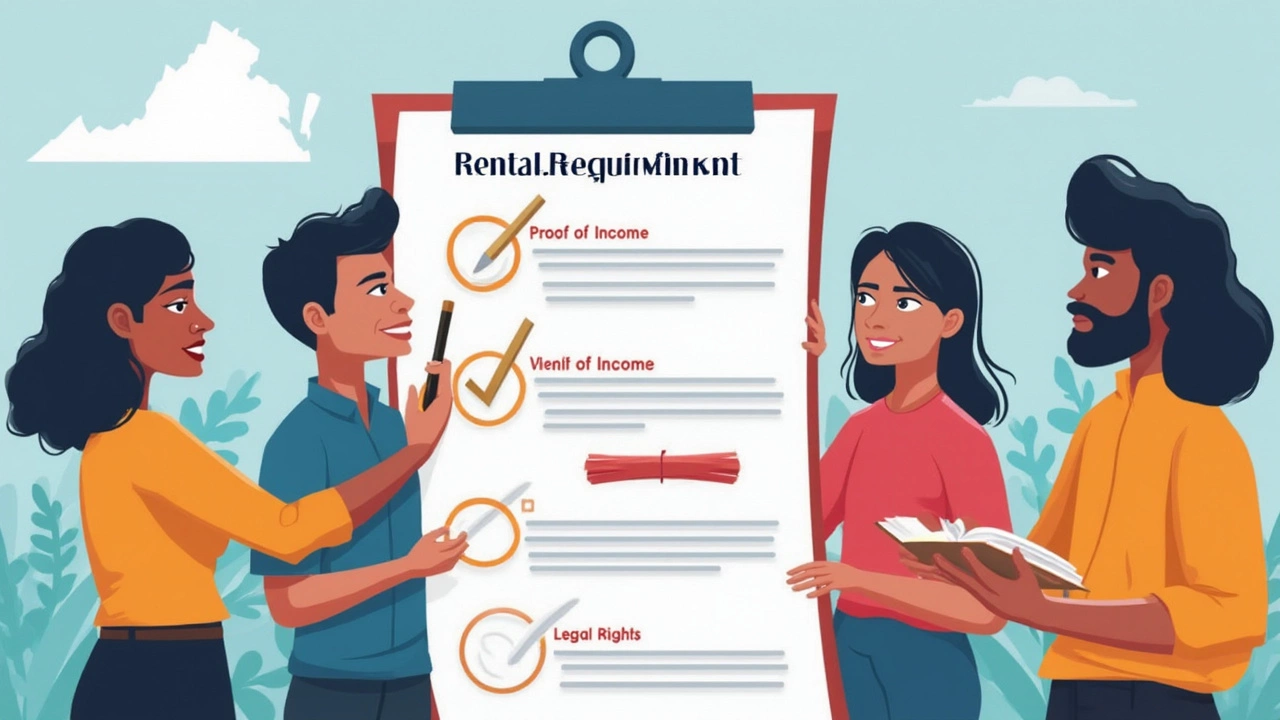If you’ve been apartment hunting in Virginia, you’ve probably seen landlords asking for proof that you make at least three times the monthly rent. It’s a common hurdle, but is it actually legal for landlords to set that kind of income requirement here?
Here’s the thing: Virginia law doesn’t spell out exact limits on how much income a landlord can require, which is why you’ll see the 3x rent rule pop up everywhere. But that doesn’t give landlords a free pass to do whatever they want—there are still rules about discrimination and fairness that apply.
If you’re a renter who doesn’t tick that 3x income box, don’t panic just yet. There are a few options you can try, like using a guarantor, offering a bigger deposit, or showing extra savings. On the flip side, if you’re a landlord thinking about the 3x rule, there are smart ways to protect yourself from problem tenants without scaring away good ones.
Understanding whether the 3x income policy is actually legal—and how it’s used in real life—can help both sides avoid trouble. Let’s break down what counts, where things can go wrong, and some tricks to keep your rental deal on track in 2025.
- What the 3x Rent Rule Actually Means
- Is It Legal in Virginia?
- Why Landlords Ask for It
- When It Crosses the Line
- Smart Moves for Renters and Landlords
What the 3x Rent Rule Actually Means
The 3x rent Virginia rule is simple: landlords want to see that your gross monthly income is at least three times what the rent costs. So, if the rent is $1,500, they want you making at least $4,500 a month before taxes.
This number comes from the idea that you should spend about a third of your income on housing, which lines up with some budgeting advice you’ve probably seen online. The rule isn’t just random—it’s used nationwide as a quick way for landlords to check if tenants might struggle to pay rent on time.
Here’s a quick breakdown of how it works in real numbers:
| Monthly Rent | Required Monthly Income |
|---|---|
| $1,200 | $3,600 |
| $1,500 | $4,500 |
| $2,000 | $6,000 |
Landlords usually look at your pay stubs, tax returns, or bank statements to check this. Some ask for combined household income if you’re moving in with other people. The goal is to feel confident that you won’t fall behind on rent.
Keep in mind, Virginia rental requirements set by the landlord can vary a lot. Some stick to the 3x rule; others might go lower or even higher, depending on the place or how tight the rental market is.
One thing to look out for—this rule is based on your gross income (that’s before taxes or deductions). It doesn’t consider things like childcare expenses, medical bills, or debt, so sometimes the rule doesn’t paint the full picture for renters who are great at managing their money.
Is It Legal in Virginia?
Here’s the straight answer: Right now, there’s no law in Virginia that bans landlords from asking for 3x the rent as a minimum income requirement. The Virginia residential landlord and tenant laws let property owners set pretty much any reasonable standard for renting, as long as they apply it to everyone and don’t break anti-discrimination laws.
This means that if a landlord wants you to earn three times the monthly rent, they’re allowed to do it. There’s no cap on income requirements set by the state. But this doesn’t mean landlords can pick and choose who they ask—it has to be the same rule for everyone who applies.
The only real catch comes from federal anti-discrimination protections. The Fair Housing Act stops landlords from using income requirements to shut out people based on race, religion, sex, family status, national origin, or disability. For example, a landlord can’t say they want 3x rent just to keep out families with kids or certain ethnicities. That would be illegal.
Here’s what you should look out for as a renter or landlord in Virginia:
- If you spot a rental ad or application with a 3x rent Virginia requirement, it’s totally above board unless it seems like it’s targeting a group the law protects.
- Some cities or counties might have extra rules on top of state law, but as of 2025, there aren’t any major local areas in Virginia with stricter limits on income requirements for rent agreement laws.
- The Virginia Real Estate Board recommends landlords stick with clear, written screening policies. That protects both sides in case someone ever questions their fairness.
Take a look at these basic protections and restrictions:
| Requirement | Allowed in VA? |
|---|---|
| 3x rent income minimum | Yes |
| Same rule for each applicant | Required |
| Rule applied just to families, not singles | No |
Long story short: Asking for proof that you make three times the rent is totally legal here. It’s only a problem if it’s used to discriminate or if it’s secretly targeting protected groups.

Why Landlords Ask for It
So, what’s the deal with the 3x rent Virginia rule? It all boils down to risk. Most landlords want to be sure their renters can actually keep up with the monthly payments, and a common way to check is looking at income. Asking for three times the rent is the shortcut a lot of them use.
The reasoning is simple—if your rent eats up more than a third of your pay, you’re more likely to slip behind because other expenses like groceries, gas, or unexpected bills compete for your cash. It’s not pulled out of thin air; national housing groups like the Urban Institute have pointed out that spending over 30% of income on rent puts people at higher risk of missing payments.
Here are a few more reasons landlords stick to this rule in Virginia:
- Lower risk of eviction: If a tenant can’t afford rent, eviction rates climb. Landlords want to avoid the hassle and cost.
- Better property upkeep: If renters aren’t stretched thin, they’re more likely to take care of the place.
- Standard practice among landlords: Lots of rental management companies use the same benchmark, so there’s some peer pressure to match the standard.
- Easier screening process: The income requirement is a quick way to shrink the pile of applications—saves time going through every detail.
You might be surprised, but according to the National Multifamily Housing Council, over 70% of rental properties across the U.S. use some version of the 3x rent rule as their main income check.
This isn’t about being harsh—most landlords are just trying to protect their investment. That said, sticking to the 3x rent rule isn’t always perfect, and it can leave some good renters out in the cold. That’s why some landlords are open to alternatives like cosigners or bigger security deposits.
When It Crosses the Line
The 3x rent rule feels like a pain, but it’s legal—unless it starts to break other laws. Here’s the catch: Virginia landlords can set high income requirements, but they have to play fair. If a landlord uses 3x rent Virginia criteria to secretly discriminate, that’s where things get dicey. Federal Fair Housing laws step in to ban discrimination based on things like race, religion, gender, disability, or family status. That applies in every part of Virginia.
Let’s say a landlord claims you don’t meet the income requirements Virginia renting test, but accepts another renter with the same or lower pay—just because of personal bias. That’s illegal. The same goes if landlords add rules that hit families with children harder, like demanding way more money because you’ve got kids. Virginia has its own laws too (see the Virginia Fair Housing Law), which back up these federal protections.
Sometimes, income rules can look neutral, but work as a quiet barrier for certain groups. For example, if someone relies on child support or government benefits, and the landlord refuses to count that as income, that can cross the line fast. As of 2024, most of Virginia doesn’t force landlords to consider things like housing vouchers, except in places like Arlington and Alexandria—which now ban income source discrimination for rentals.
How can you tell if a landlord’s gone too far? Watch for sudden rule changes, shady reasons for denial, or rules that don’t show up until they know something about you (like your race or disability). You can:
- Ask the landlord to put all requirements in writing before you apply.
- Compare your experience to other applicants.
- Keep a record of all communication about your rent agreement laws.
- If turned down, politely ask for the specific reason—sometimes landlords get flustered when forced to explain.
- Don’t be afraid to call Virginia’s Fair Housing Office if something feels off.
Here’s a quick glance at where most tenant lawsuits come from when landlords trip over the line:
| Violation | Reported Cases in VA (2023) |
|---|---|
| Race Discrimination | 151 |
| National Origin Discrimination | 79 |
| Family/Children Discrimination | 66 |
| Disability Discrimination | 94 |
Bottom line? The 3x rent Virginia requirement is fine as long as it’s used across the board. The minute it’s just a mask for unfair treatment or hidden rules, it’s illegal—and smart tenants know their rights.

Smart Moves for Renters and Landlords
If you’re hunting for an apartment in Virginia and facing a 3x rent Virginia rule, don’t just walk away frustrated—there are a few practical moves you can try first. And if you’re a landlord, knowing how to be flexible with your Virginia rental requirements can mean fewer empty units and better tenants.
Let’s get into specific tips for both sides:
- Show All Sources of Income: If your main job doesn't quite hit the 3x mark, list side gigs, bonuses, or regular support payments. Landlords in Virginia often accept consistent secondary income if you can show documentation.
- Use a Guarantor or Co-Signer: Many rental agreements in the state allow a guarantor—usually a parent, family member, or someone with higher income who backs your rent. This is a pretty common workaround that most landlords understand.
- Offer a Higher Deposit: While there are caps (by law, landlords can’t demand more than two months’ rent as a security deposit in Virginia), showing you can pay more upfront sometimes tips things in your favor, especially if your income is close to the line.
- Show Savings or Assets: A healthy savings account or investment balance can reassure landlords that you’ll pay on time, even if your monthly income looks borderline.
- Submit Stellar References: Letters from previous landlords or bosses can make a big difference. If you can prove that you’re reliable and pay on time, it can sometimes outweigh strict income rules.
Now, for landlords, setting a rent agreement law Virginia policy like the 3x rule isn’t illegal—but it should never cross into discrimination against protected classes (race, religion, disability, etc.). Keep your policies consistent. If you make exceptions, have a clear paper trail so it doesn’t look like you’re playing favorites.
Most landlords in Virginia do background and credit checks. Fun fact: According to a 2024 survey from Zillow, about 83% of Virginia landlords check credit, but only about 60% are strict about the 3x rent rule. That’s a pretty big gap and shows there’s room for conversation and negotiation.
Here’s a quick look at common backup options renters use when negotiating with landlords in Virginia:
| Option | How Often Accepted (Estimate) |
|---|---|
| Guarantor/Co-signer | 70% |
| Higher Deposit | 60% |
| Proof of Savings | 50% |
| Stellar References | 40% |
If you’re a renter in a tight spot, don’t be shy about opening a conversation. It's not unusual for a landlord to bend on the 3x rule for tenants who show they’re low risk. And landlords who stay flexible tend to fill vacancies faster—less lost rent, less hassle.


